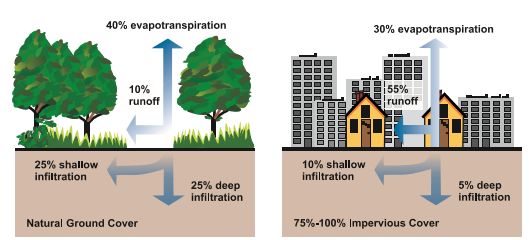What is storm water?
Put simply, storm water is water runoff from storms. In the City of Corpus Christi, the majority of our storm water is rain water, but storm water also includes water from hail and snow.
In a natural landscape, like a forest or grassland, storm water can easily be soaked into the ground to become groundwater. In urban landscapes, such as the City of Corpus Christi, storm water falls onto paved surfaces, like streets, parking lots and driveways. These types of paved surfaces do not allow the water to soak into the ground. The pavement increases the amount of water that flows into surface water bodies, like creeks, streams, and bays.

Relationship between impervious cover and surface runoff. Impervious cover in a watershed results in increased surface runoff. As little as 10 percent impervious cover in a watershed can result in stream degradation.
What’s the problem?
As storm water flows over paved surfaces, it collects materials including litter, animal waste, pesticides, fertilizers, oil, grease, loose dirt, and other substances that can pollute water. Unlike wastewater, storm water is not treated or cleaned before it enters our bays and estuaries, so any substances it collects will flow into these waters.
How can you help?
The best way to keep storm water clean is to prevent pollution before it happens! We all contribute to storm water pollution, which means we can all make a difference! You can prevent pollution by doing the following:
- Put waste in its place - by disposing of trash into trash cans!
- Scoop the poop! Pick up dog waste and put it in the trash where it belongs.
- Sweep and bag leaves and grass clippings and dispose in the trash.
- Wash your car on the grass instead of in the driveway to help prevent soapy water from going into the storm drain.
- Dispose of household hazardous waste, such as used motor oil, tiers, grease, and batteries at the J.C. Elliot Transfer Station.
- Always follow the label on pesticides and fertilizers!
- Do not apply fertilizer to your lawn or garden before it rains.
- Do not discard or dump anything down a storm drain!
- Learn more about specific types of pollution
- Lead by example and tell your friends and family how they can make a difference and keep our water clean and protected!
Education Programs
The Storm Water Pollution Prevention Division is committed to educating the community about storm water pollution and how we can all make a difference and keep our water clean!
Through the Storm Inlet Marking Program volunteers help mark storm inlets with the message “No Dumping – Drains to Waterway” to help reduce illegal dumping into storm drains and inform the community about the connection between the storm inlet and our local waterways.
At community cleanup events organized by the Storm Water Pollution Prevention Division volunteers pick up trash and litter to keep our parks and beaches clean. Follow us on Facebook @CCStormWater to learn about upcoming community cleanup events!
Storm Water Pollution Prevention staff are available to attend school and community events, such as Earth Days and Science Spectaculars to provide watershed, storm water, and pollution prevention education and outreach activities. Staff are also available to make class room presentations. Contact us at pollutionprevention@cctexas.com to invite the Storm Water Pollution Prevention Division to your event or visit your classroom!
Educational Materials
The Storm Water Pollution Prevention Division produces handouts, brochures, billboards, and public service announcements to promote pollution prevention!
- Brochure – Storm Water Department
- Billboard – Clean Bays Start at Home
- Billboard – Bag It Don’t Blow It
- Billboard – Scoop It Don’t Leave It
- Postcard - Keep it Flowing. Keep it Clean.
- Poster – The Trash Trail
- PSA - Over fertilizing your lawn can harm the bay
Contact us!
For more information about how you can protect our bays and estuaries by keeping storm water clean, contact us at pollutionprevention@cctexas.com.
Follow us on Facebook @CCStormWater for updates on events, activities, and more!
Report flooding, drainage issues, and illegal dumping to the Customer Call Center by calling 311.
- Storm Water FAQ's
- Storm Inlet Marking Program
- Storm Water Pollution Prevention
- City of Corpus Christi Storm Water Annual Report
- City of Corpus Christi Storm Water Management Program PDF
- TCEQ Nonpoint Source Pollution: Public Education
- TCEQ Environmental Resources for Educators
- EPA Polluted Runoff: Nonpoint Source Pollution

